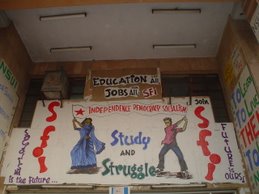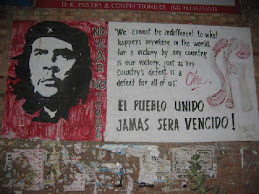STUDENTS’ FEDERATION OF INDIA-ALL INDIA STUDENTS’ FEDERATION
03.08.07
Friends,
The barbarity of the police firing on peaceful protestors in Mudigonda village in the Khammam district of Andhra Pradesh is, indeed, unprecedented in recent memory. The people of the state were stunned to see the live media coverage of this outrageous police action where peaceful Left Parties’ protestors led by the CPI(M) were gunned down at point blank range. Six died on the spot. Another succumbed to injuries later. 16 people were grievously injured. One person was killed as he was making a call from an STD booth. A truck driver was killed when he stopped his truck from moving ahead seeing the commotion. Clearly, the police forces came with a premeditated plan of firing to kill. In fact, not even one of them such as tear gassing, water cannons etc., were used. The police fired 80 rounds and left only when their ammunition was exhausted. Far from showing any repentance or remorse, the state administration, led by the chief minister, has embarked on an offensive not merely defending but justifying the action. In order to understand as to why the Andhra Pradesh state government has resorted to such brutal repression and continues to justify, it is necessary to briefly recapitulate the origins and character of this land struggle launched by the Left parties.
The barbarity of the police firing on peaceful protestors in Mudigonda village in the Khammam district of Andhra Pradesh is, indeed, unprecedented in recent memory. The people of the state were stunned to see the live media coverage of this outrageous police action where peaceful Left Parties’ protestors led by the CPI(M) were gunned down at point blank range. Six died on the spot. Another succumbed to injuries later. 16 people were grievously injured. One person was killed as he was making a call from an STD booth. A truck driver was killed when he stopped his truck from moving ahead seeing the commotion. Clearly, the police forces came with a premeditated plan of firing to kill. In fact, not even one of them such as tear gassing, water cannons etc., were used. The police fired 80 rounds and left only when their ammunition was exhausted. Far from showing any repentance or remorse, the state administration, led by the chief minister, has embarked on an offensive not merely defending but justifying the action. In order to understand as to why the Andhra Pradesh state government has resorted to such brutal repression and continues to justify, it is necessary to briefly recapitulate the origins and character of this land struggle launched by the Left parties.
In response to the CPI(M)’s demand to have a proper assessment of the overall availability and distribution of land, the state government had constituted a land committee under the chairmanship of Shri Koneru Rangarao, a cabinet minister, in December 2004. This committee gave its report in 2006. In Andhra Pradesh, around 42 lakh acres of assigned land was being illegally occupied by the land mafias and vested interests. In an embarrassing moment for the Congress party, the chief minister himself had to return assigned lands illegally held by his family without offering any explanation as to how such lands came under his possession to begin with. In order to legalise such illegal occupation of assigned lands (the list of people in possession of such lands is a virtual who’s who of the ruling class political parties leaders and big influential businessmen), the state government issued a government order under the amended act bringing assigned lands under 54 mandals surrounding Hyderabad under its control. Rs. One lakh crore of property legitimately belonging to the poor was now being legally taken over by the vested interests. Simultaneously, large irregularities were found in the implementation of the Indiramma housing scheme. The fact remains that without the compliance of the same government departments, irregularities could not have taken place in the first place.
Seeing the intransigence of the state government, the CPI(M) launched an agitation on the protection of the assigned lands on May 2, 2007 in Warangal. The spontaneous response of the people was so overwhelming that this struggle spread throughout the state within a week. 195 mass organisations including various societies, movements etc., came under a single umbrella to carry forward this struggle to protect the assigned lands. Throughout the months of May and June, hundreds of thousands of people, braving the heat wave, came out on to the streets. These were met with brutal suppression. Over 24,000 cases have been booked (over 5,000 on women) and 3,080 had been jailed before this police firing. All prominent CPI(M) leaders have cases of land grabbing foisted on them. Given the state government’s intransigence on July 15, twenty five leaders of the struggle committee, went on a week-long hunger strike. When the state government’s intransigence continued by refusing to enter into any discussions with the leaders of the movement, the state secretaries of the CPI(M) and the CPI, went on an indefinite hunger strike outside the state assembly on July 22. Similar hunger strikes began in all the taluk headquarters all across the state. The state assembly was in session. The government, however, was not prepared to either discuss in the assembly or with the leaders on hunger strike. Instead, at midnight after the assembly adjourned on July 27, the leaders on hunger strike were arrested. This led to the eruption of mass anger and call for a successful statewide bandh on July 28 when this brutal firing took place in Mudigonda. Despite lakhs of people all across the state spontaneously coming out in this movement (in Hyderabad city alone, over 1.5 lakh people applied for house sites), the state government’s brazenness can only be understood by its deep links with the vested interests who want to misappropriate public resources on a massive scale. It is for this reason that they continue not only to justify the police action but spread malicious disinformation about CPI(M) and its leadership. It is the CPI(M) cadre’s vandalisation and attack on the police which led to the police firing is one such disinformation.
The brutal repression by the Andhra Pradesh government once again exposed the dominance of landed interests in the Congress party and bourgeois-landlord class character of the government. The struggle for land will continue as long as our demand regarding the land to the poor is not met and it will intensify in the days to come.
DOWN WITH THE UNDEMOCRATIC YSR REDDY GOVERNMENT!!
OUR STRUGGLE FOR LAND TO THE POOR LONG LIVE!!
OUR STRUGGLE FOR LAND TO THE POOR LONG LIVE!!
PUBLIC MEETING:
LAND STRUGGLE IN ANDHRA PRADESH: BRUTAL REPRESSION OF THE CONGRESS GOVERNMENT
Speakers:
- Com. P Madhu ( CPI(M) MP, Rajya Sabha from Andhra Pradesh and one of the leaders who led the hunger strike).
- Com. Suneet Chopra (Central Committee Member, CPI(M), Joint Secy. AIAWU).
- Com. Sudhakar Reddy ( MP, Lok Sabha from Andhra Pradesh and Member of the National Council, CPI).
Venue: Kaveri Mess 9:15pm 3rd August, 2007 (tonight)
Sd/- Rajiv Kumar Ranjan, Secretary, SFI-JNU.
Sd/- Fauzan, Jt.Secy, AISF-JNU.




